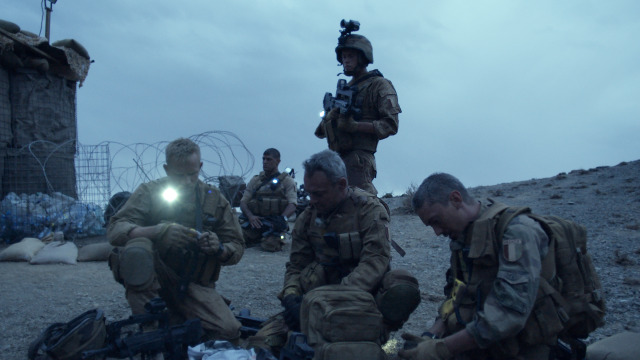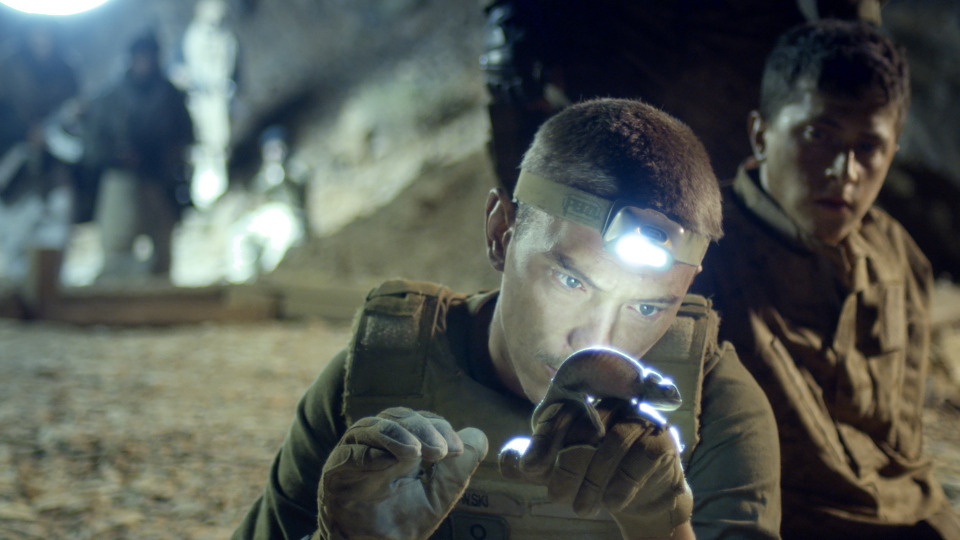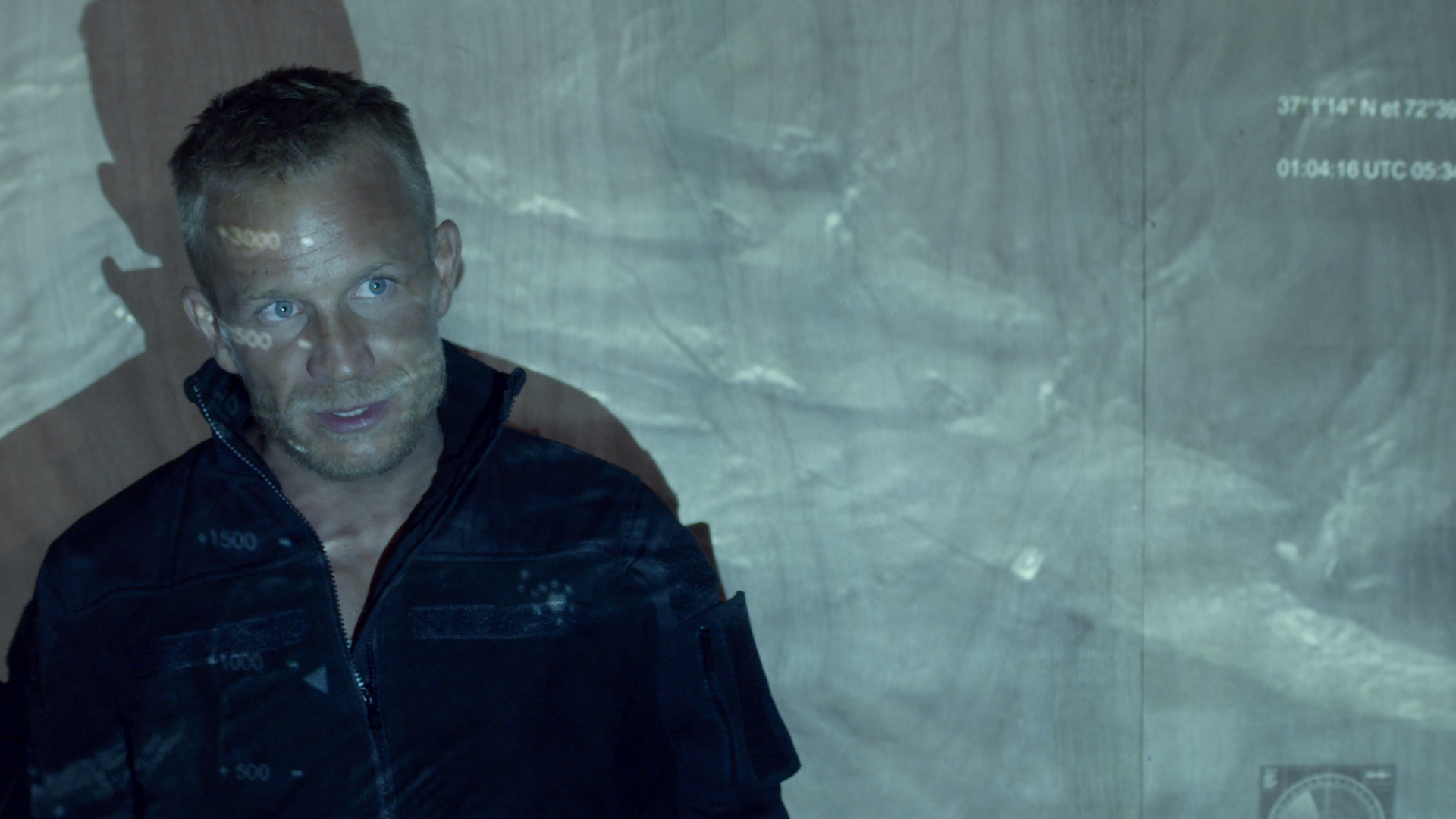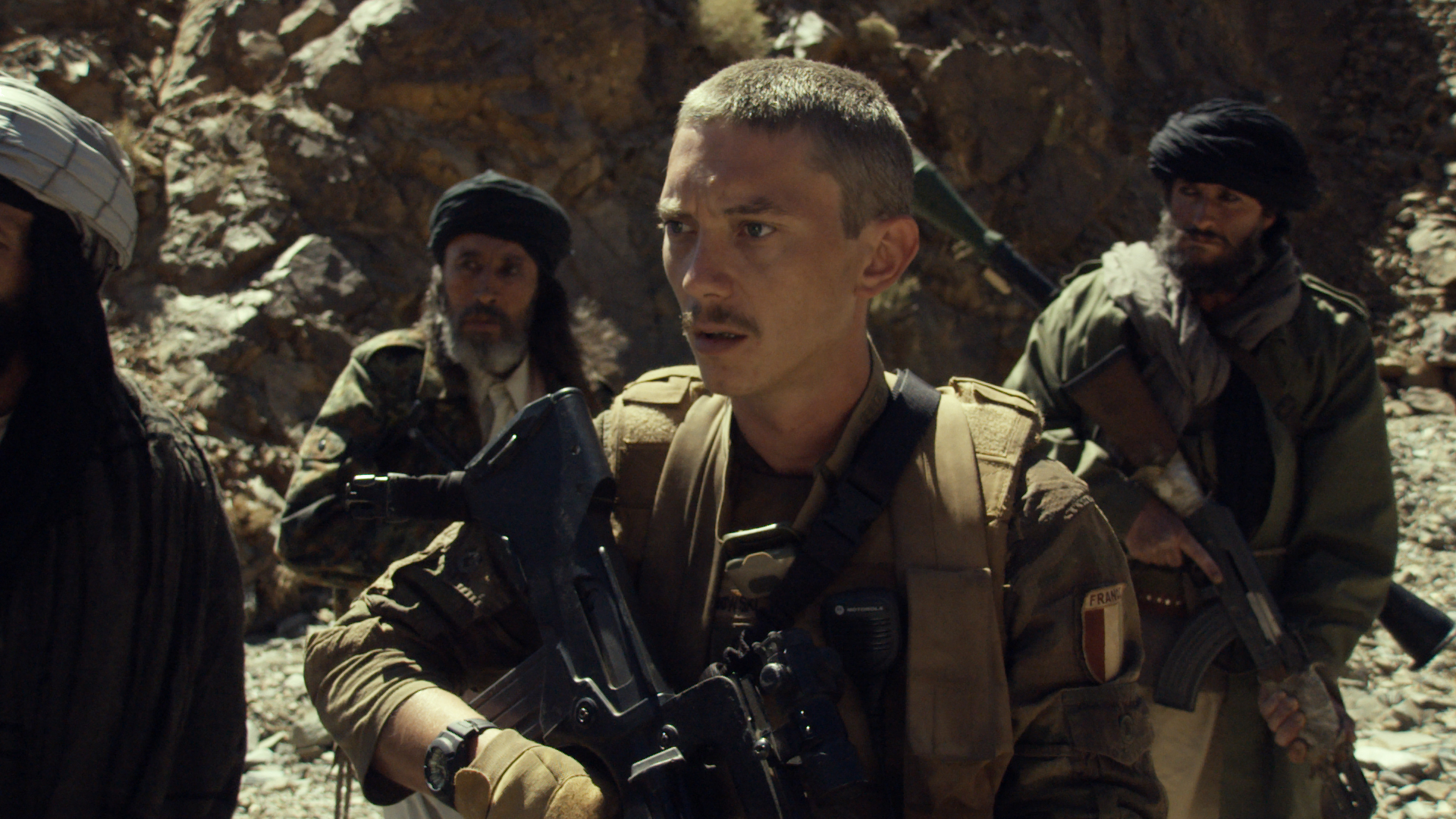Neither Heaven Nor Earth
 Friday, March 18, 2016 at 11:25AM
Friday, March 18, 2016 at 11:25AM
New Directors New Cinema
Screening at the Walter Reade 3:45 Saturday 3/19 and at MOMA 3:45 Sunday 3/20
A Film Movement Release
Making the unreal real’s easier with CGI, but showing the monster always undermines the poetry. Just ask Rod Serling. Or, better yet, Edgar Allen Poe. Poe describes events, not the underlying cause, which events conceal and, in time, reveal. Metaphor is all the explanation you’re going to get. The Raven says: “Nevermore.” Any questions?

First time director/screenwriter Clément Cogitore understands the tension between knowing and showing. He walks that tightrope to near-perfection. Though he frames his tale as a war story, Cogitore’s vested in Noir, and how noble impulses prove fruitless in a corrupted world. Cogitore’s subtle camera and intelligent screenplay combine to make Neither one of more thought-provoking, memorable and enjoyable films of the year – brainy, gritty and unpredictable.
Cogitore offers no more clarification than is available to the boots on the ground. Those boots belong to a French army force guarding a remote, lethal valley in the Afghan boondocks. The landscape and lonely guard-shacks perched atop inaccessible ridgelines evoke Sebastian Junger’s fine documentary Restrepo. Neither captures Restrepo’s universe of soldier’s time-passing banter and instant, out-of-nowhere warfare. Cogitore reveals their lives and character, as did Restrepo, in telling details – who’s reliable; who’s a headcase; who’s trigger-happy. The soldiers are restless. They want a battle. They fetishize their weaponry, but every pointless sura with the local elders proves they have no power.
Jérémire Renier embodies this frustration as French Captain Bonassieu, a staunch military man with the inner torments of a Noir protagonist. Bonassieu’s a new archetype of war hero. He recognizes the limits of his reach, defaults to compassion instead of violence and believes he can think his way out of most dilemmas. Afghanistan proves him wrong, of course.
The story starts with bored soldiers and establishes the depth of their isolation, whether in their ridgeline shacks or their bristling base in the valley. The soldiers have cell phones and Skype and a nearby ancient village of civilians who laugh in their faces, call them filthy Christians and wish them dead. One night, the villagers climb an adjacent ridgeline and burn something in a huge-ass, ritual bonfire.
The soldiers peer through night-vision goggles and infrared scopes, but the blaze washes out their technology. Here’s the first link in Cogitore’s powerful chain of metaphors. The French have the gizmos, but can’t parse the ancient world. They see in the dark, but remain blind.

After the bonfire, a French soldier disappears. Vanishes into thin air. Then another. Then, another. The Noir-faced captain assumes desertion or Taliban abduction. Bonassieu rips up the village to no avail. Everyone there knows what’s happening, and find his rage amusing. He sets up the usual useless protection against nocturnal forces: motion detectors, spotlights, sturdier walls. Bonassieu won’t admit it, but he’s scared shitless. His men are scared shitless. He shouts down the valley through a loudspeaker, asking the Taliban for parley. When they finally show up, guess what? The Taliban are scared shitless, too.
And so was I.
I was scared shitless this weird, self-aware character study in the guise of a war movie was about to turn into supernatural horseshit. Happily, my fears were groundless. But if I explain why, I’ll give away the plot.
It’s a horror-movie and Afghanistan-movie trope to present Westerners and natives as embodying the rational and irrational in opposition. The trope states plainly or indicates that the natives possess inbred wisdom and inchoate chthonic powers the over-thinking, fair-playing Westerners will never – and really, shouldn’t want to – understand. Horror movies and Afghanistan movies present this binary as a threat to the very (Christian) soul of Westerners. If they embrace the local dark arts, their mortal selves will be in peril. This goes as far back as King Kong and appears as recently as American Sniper. Neither vests in this binary, but only to the point of illustrating the profound and unshakeable mutual hatred between invader and invaded. It escapes being colonialist propaganda – is there another Afghanistan war film that does? – by one simple expedient.
The awakened chthonic forces attack both sides with the equal force. This is the next link in Cogitore’s metaphor-chain. In a philosophically less complex film, the villagers’ bonfire would symbolize the locals unleashing their primitive mojo against which 21st Century industrialization proves powerless. Instead, Cogitore leaves no doubt that both sides evoked the demonic by their treatment of each other. It isn’t the villagers, per se, that are sick of their warrior bullshit. It’s the soul of the land itself.
 The Captain is scared shitless
The Captain is scared shitless
The Taliban employ a cruder, more homemade talisman against disappearance. In one of the most unsettling and memorable shots of recent times, they come around a corner of a mountain trail, tied to one another by long, dusty ropes. When the French soldiers see those ropes, their jaws drop and they look at each other all: “Sacré merde!” We’re in Poe territory now.
The Taliban leader calls to the Captain: “Where are my men?” Bonassieu’s answers with the same question. Cogitore’s metaphors now define the action. He’s compressed the Afghan conflict to one query and its echo. Each adversary wants to know what the other’s done with his men. Neither can answer, because neither knows.
Cogitore’s formal rigor and control ensure nobody asks about the ropes. We see them. Everybody knows what they’re for. A more obvious director would cut to big whomping close-up of a rope around somebody’s ankle. But Cogitore never gilds the lily or cheats. He builds suspense without giving the game away. He relies on simple compositions, steady narrative rhythm, recognizable exploitation devices, moments you’ve never seen before and rich, credible characters, especially the Taliban commander. The story does not hide knowledge or clues from the viewer. The audience knows what the soldiers know and shares their what the fuck?
The two sides form a hair-trigger alliance. The seething hatred of the Taliban’s leader underscores his bafflement and terror. Heavy shit’s going down, or these groups would tear each other to shreds. As Bonassieu pursues increasingly deranged solutions, the fate of the disappeared becomes less important than the fact of their disappearance. It slowly dawns on everyone they ain’t coming back.
Cogitore builds wrenching claustrophobia from the building – and justified – panic of the French and the Taliban. Any second now, they might start blasting each other out of sheer frustration. That they don’t underscores the power of the mystery surrounding them. They’re too awe-struck to kill. When they finally accept that greater forces are at play, neither offers camaraderie. The two squads drift apart, back to war, content to believe each suffered equally.
Jérémire Renier’s balanced performance – at times totally in control, at times berserk with frustration – fuels the tension. His understated charisma vests in his struggle. Bonassieu may accept the power of the irrational, but his superiors sure won’t. To protect the mystery, he enacts an honorable solution to cover any administrative questions. The solution leaves his career in tatters. Bonassieu takes the blame, as he feels he should, but for what? His self-sacrifice in the face of the unknowable raises another metaphor of this war, of worthy ideals shredded for nothing.
Like a lot of recent debuts, Neither doesn’t end when it ought to, but tacks on two or three extraneous shots that weaken its power. Those are Cogitore’s only structural errors. Lesser directors would preach about the pointlessness of war or signpost every crucial moment or have someone monologue about how the rhythms of the unseen thwart human intention. Instead, Cogitore gets his Howard Hawks on and simply tells the tale.
 Sacré merde!
Sacré merde!
 Afghanistan,
Afghanistan,  French,
French,  war movie
war movie 
